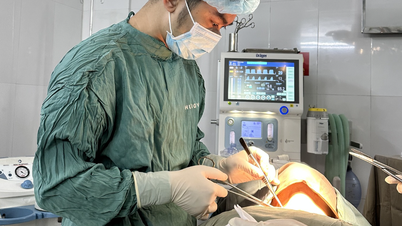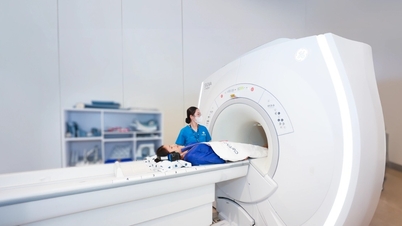Digestion begins in the mouth, so food needs to be chewed thoroughly before swallowing. Chewing food thoroughly will reduce the stress on the stomach and the rest of the digestive tract afterward.

Due to eating habits and time pressure, many people eat quickly and chew and swallow hastily, which negatively affects their health. Illustrative photo.
The harmful effects of eating fast and chewing hastily on health
If you eat too quickly or don't chew thoroughly, large pieces of food can cause choking. Natural bacteria in the gut can ferment undigested food, multiplying and leading to symptoms of bloating, indigestion or constipation.
In addition, eating too fast and not chewing thoroughly can cause many long-term health problems, disrupt metabolism leading to obesity, high blood sugar and can increase the risk of cardiovascular disease, diabetes...
Eating quickly and chewing less causes us to consume more food and calories, leading to overweight and obesity. Eating quickly can disrupt the hormones in the gut that help regulate appetite and tell you when you are full. Eating quickly also reduces the thermogenic effect of food - the increase in metabolism that occurs after eating.
Many studies show that people who eat fast have a higher risk of being overweight and obese. You need to understand that the brain needs a certain amount of time to know that you are full. If you eat too fast, the brain will not have time to realize that you are full and will make you eat more than your body really needs, so your body will gain weight in a short time.
Food brought into the oral cavity will be crushed by the mouth before going down to the stomach. When you chew thoroughly, the food is crushed and goes down easily, helping the chain of food digestion activities to operate more smoothly and gently. The stomach will reduce pressure at the time of receiving food.
If you do not concentrate while eating, eat too fast, the food will not be processed properly. At this time, a large amount of food reaches the stomach still in a raw state. The stomach must increase contractions and increase acid secretion to digest this food again.
Food and acid stay longer, which can cause the stomach lining to be eroded by the gastric acid itself. If fast eating continues, gastric and duodenal ulcers are difficult to avoid.
Furthermore, not chewing thoroughly and swallowing quickly causes food and gastric acid to rush into the stomach, easily leading to digestive disorders and other symptoms such as bloating, flatulence, etc. This can completely increase the risk of stomach pain, stomach ulcers, leading to abdominal pain, nausea or vomiting when eating, etc.
Erosive inflammation of the gastric mucosa causes shallow erosions or sometimes deep ulcers. The disease can easily become chronic and difficult to cure.
- Metabolic syndrome
Insulin resistance is strongly linked to metabolic syndrome, a cluster of factors that increase the risk of developing not only diabetes but also heart disease and stroke. Research shows that fast eaters are more likely to have metabolic syndrome than slow eaters.
In particular, many fast eaters tend to have large waistlines and low levels of HDL (good) cholesterol. These are two of the risk factors that make up metabolic syndrome, and they are often precursors to heart disease.
- Disconnection from hunger and fullness signals
In fact, when we eat, it takes about 20 minutes for the stomach to tell the brain that it is full. Regularly eating quickly obscures the body's natural satiety signals, you risk losing touch with natural hunger and satiety signals, which can easily lead to emotional eating in the long run.

At mealtimes, you should sit down and focus on eating. Avoid situations that make it easy to gobble food without paying attention, such as eating while working, eating in the car, eating while watching TV, or looking at your phone.
Solutions to limit fast eating and hasty chewing and swallowing
- 1. Chew slowly
One of the simplest and most effective ways to slow down your eating is to chew your food more thoroughly and slowly. Chewing slowly gives your stomach enough time to signal to your brain that it is full. This is also a good way to help you limit overeating.
- 2. Concentrate while eating
At mealtimes, you should sit down and focus on eating. Avoid situations that make it easy for you to gobble up food without paying attention, such as eating while working, eating in the car, eating while watching TV, looking at your phone, etc. Focusing on eating will not only help you eat slower but also help your body digest better.
- 3. Eat on time
It is important to schedule your meals at a certain time. When you have a meal schedule, it is easier to choose a healthy food list.
People who do not have a meal plan tend to eat whatever they feel hungry. Most of them choose unhealthy foods like fast food, processed foods, etc.
- 4. Drink a glass of water before eating
You may have heard that drinking more water can help you lose weight, and there is some truth to that. When we realize we are hungry, our first impulse is to reach for food. You can reduce your appetite by drinking water.
After drinking water, your appetite will naturally decrease. Then you can eat slowly and eat less food and still feel full. Be careful to avoid high-calorie, sugary drinks.
Dr. Nguyen Xuan
Source


![[Photo] National Assembly Chairman Tran Thanh Man chairs the 8th Conference of full-time National Assembly deputies](https://vphoto.vietnam.vn/thumb/1200x675/vietnam/resource/IMAGE/2025/9/29/2c21459bc38d44ffaacd679ab9a0477c)
![[Photo] General Secretary To Lam receives US Ambassador to Vietnam Marc Knapper](https://vphoto.vietnam.vn/thumb/1200x675/vietnam/resource/IMAGE/2025/9/29/c8fd0761aa184da7814aee57d87c49b3)
![[Photo] Many streets in Hanoi were flooded due to the effects of storm Bualoi](https://vphoto.vietnam.vn/thumb/1200x675/vietnam/resource/IMAGE/2025/9/29/18b658aa0fa2495c927ade4bbe0096df)
![[Photo] General Secretary To Lam attends the ceremony to celebrate the 80th anniversary of the post and telecommunications sector and the 66th anniversary of the science and technology sector.](https://vphoto.vietnam.vn/thumb/1200x675/vietnam/resource/IMAGE/2025/9/29/8e86b39b8fe44121a2b14a031f4cef46)


























































































Comment (0)